New DCR Indigenous peoples partnership coordinator visits Turners Falls
| Published: 11-22-2024 3:18 PM |
TURNERS FALLS — The state Department of Conservation and Recreation’s new Indigenous Peoples Partnership Coordinator Leah Hopkins, tasked with fostering relationships and improving the understanding and collaboration between DCR and Indigenous tribes, wrapped up a series of meet and greets with a western Massachusetts visit.
Hopkins started in the position, announced during Native American Heritage Month, on Nov. 4, before embarking on a series of meet and greets ending in Turners Falls on Wednesday. Part of the idea behind the new role is to ensure that Indigenous voices, relayed by Hopkins, can help inform DCR’s stewardship of the land and waters.
“It’s more important than ever that we create pathways for Indigenous communities to directly influence the stewardship of public lands and strategies to combat climate change,” Energy and Environmental Affairs Secretary Rebecca Tepper said in DCR’s announcement. “Leah Hopkins’ dedication and passion will expand our understanding of traditional ecological knowledge, improve our relationships with diverse Native cultures and advance our environmental justice priorities.”
“As the steward of more than 450,000 acres of public lands across Massachusetts that are filled with a rich cultural history, DCR has an obligation to work hand in hand with our Indigenous and Native communities — the first stewards and caretakers of our state’s lands and waters — to preserve these treasured spaces for the well-being of all,” DCR Commissioner Brian Arrigo said in the announcement. “Leah’s lived experience as a Native person, strong connections to tribal nations and Indigenous communities across our state, and her passion for our public lands will be critical to DCR as we work to foster new partnerships and incorporate the Native voice into the stewardship of our natural resources.”
Hopkins, a member of the Narragansett Indian Tribe and a native of Rhode Island, has more than a decade of experience in helping tribes build relationships with outside entities like museums, nonprofits and land conservancies. She most recently worked at Brown University’s Haffenreffer Museum of Anthropology, where she was the manager of museum education and programming. She holds a bachelor’s degree in anthropology with a concentration in Indigenous studies from the University of Rhode Island.
As part of her talk at the Great Falls Discovery Center on Wednesday, Hopkins spoke about her family, her time educating her children on Native American traditions and her Indigenous bloodline dating back 14,000 years on the New England coast. A major element of the discussion was relationship building, reciprocity and reconciliation.
“It is a cycle and these things all feed into each other,” Hopkins said. “If you want to build a relationship with an Indigenous community, first you have to come in and delve into reciprocity with that community. Just as people are having reciprocity of the land, you need to be reciprocal to the Native people.”
This idea of relationship building, reciprocity and reconciliation, Hopkins elaborated, deals with keeping relationships not as transactional, but as mutual partnerships that are beneficial between the Native tribes and those seeking information or services, like DCR or other state agencies. Hopkins stressed that her goal as Indigenous peoples partnership coordinator is to foster these relationships and be a resource connecting the state and the Native American tribes.
Article continues after...
Yesterday's Most Read Articles
Upon asking attendees what they would like Indigenous people to know, Montague Town Administrator Walter Ramsey told Hopkins, “We want to reconcile over past injustices that have happened on this land.”
Ramsey was referencing the Great Falls Massacre of May 19, 1676, considered to be the major turning point of King Philip’s War, when 300 women, children and elders were killed during a surprise pre-dawn attack by Capt. William Turner — for whom Turners Falls is named — and colonial militiamen. The town has marked the anniversary of the event with a yearly Day of Remembrance, which is in some ways a continuation of the reconciliation ceremony of 2004, when the town of Montague and members of the Narragansett tribe formally recognized the 1676 conflict.
Attendees were also asked to give their thoughts on subjects like effective communication between state agencies and Indigenous people, decision-making with proper consent between the state and Native American tribes, land and border recognitions, and historical agreements.
Montague Town Planner Maureen Pollock shared her takeaways as a member of town government.
“As the town of Montague continues its own work in restoring relationships with local Native tribes, we applaud DCR’s efforts as a good step in the right direction,” she wrote in an email about Hopkins’ newly created position. “We look forward in finding ways to engage in collaborative efforts.”
David Brule, president of the Nolumbeka Project, an Indigenous history and culture preservation nonprofit, said he recognizes how tough Hopkins’ job may be, but that she has the qualifications to do it.
“She will be the go-between between the state and the tribes, and that’s going to be challenging because she will have to, as she admitted, have to win the confidence of the tribes,” Brule said, adding that he’s known Hopkins for at least a decade and he has confidence in her ability and her background. “She’s as authentic and has as much integrity as anybody, but it’s going to be a challenge.”
Moving forward, Hopkins said her plans are to reach out to many of the tribal nations in Massachusetts to start cultivating relationships.
“I think as an Indigenous person I understand how important coming into a space and being humble and listening is. I don’t have all the answers, I’m not going to have all the answers, but this is something that I can bring back to the agency, and start assessing the needs and find the overlaps in needs,” Hopkins said, adding that there is a sense of shared responsibility and goals between the tribes and state agencies.
Hopkins has been to Turners Falls and this portion of western Massachusetts before, and she said she plans to continue to visit as part of her work as Indigenous peoples partnership coordinator.
Erin-Leigh Hoffman can be reached at ehoffman@recorder.com or 413-930-4231.

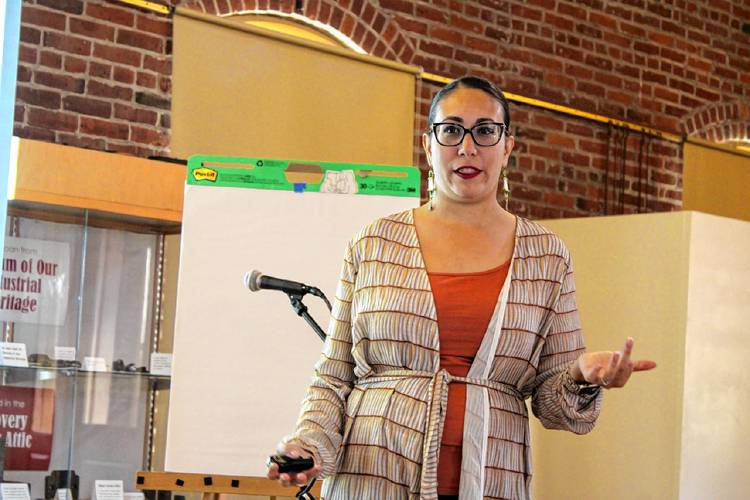
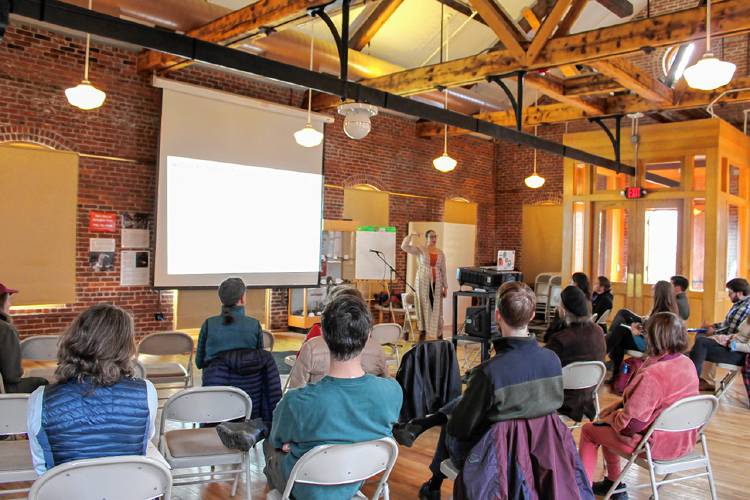
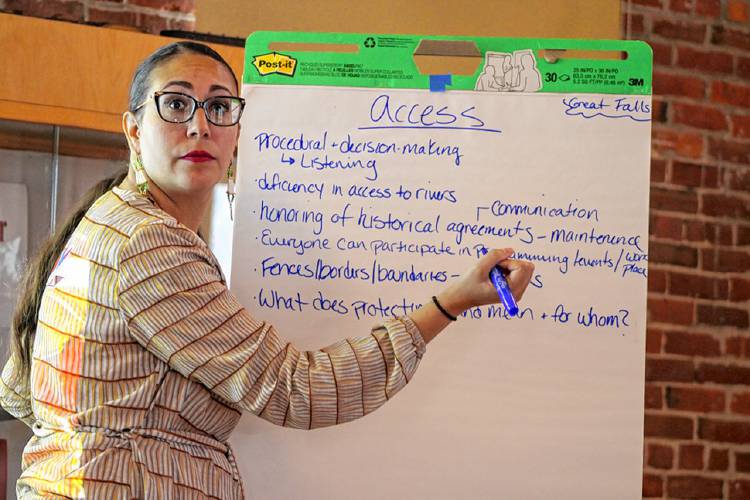


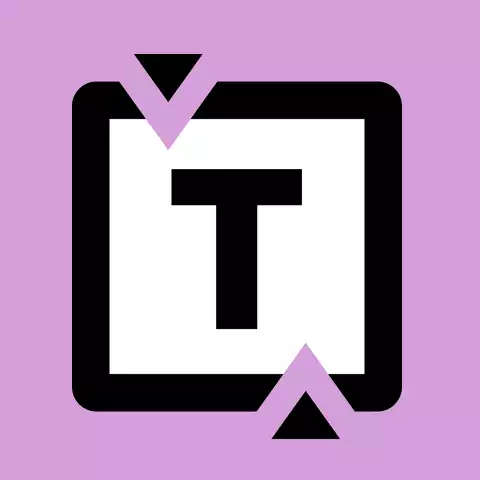


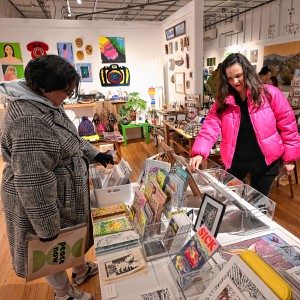 ‘It’s a Wonderful Night in Turners Falls’ showcases village businesses, nonprofits
‘It’s a Wonderful Night in Turners Falls’ showcases village businesses, nonprofits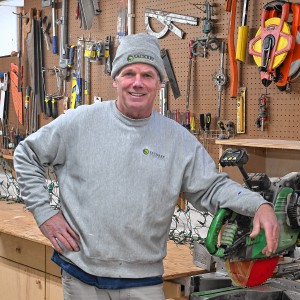 Sackrey Construction Co. of Sunderland celebrating 35 years in business
Sackrey Construction Co. of Sunderland celebrating 35 years in business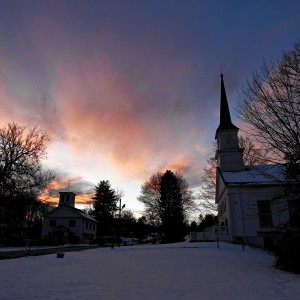 Photo: As darkness falls
Photo: As darkness falls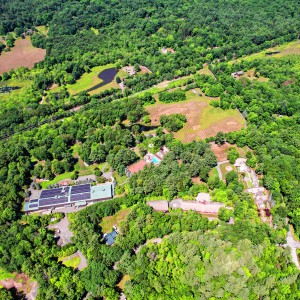 Leverett residents rap Kittredge compound plans, urge caution as negotiations for 400 homes move forward
Leverett residents rap Kittredge compound plans, urge caution as negotiations for 400 homes move forward 
